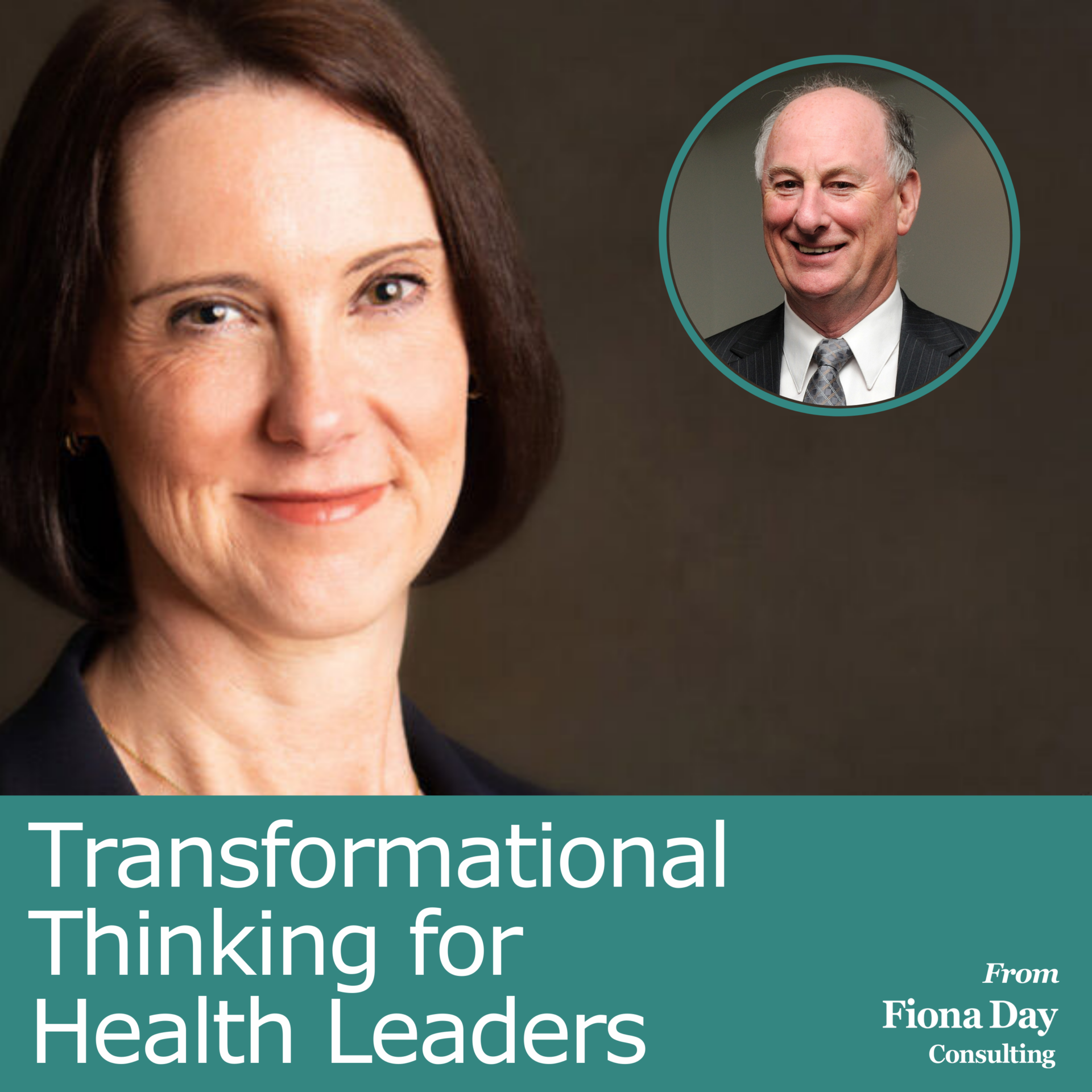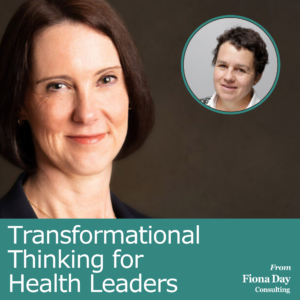In my recent podcast, Transformational Thinking for Health Leaders, I had the pleasure of catching up with Professor James Dunbar, a seasoned leader in the healthcare field whose work has spanned clinical practice, academia, and even environmental activism. As a GP, military officer, academic, and now a policy advocate, James has always set the bar high—fostering a culture of excellence in every field he has touched. Our conversation left me inspired, and I wanted to share some of the key insights he shared on cultivating effective, impactful leadership in health.
So, if you’re a health leader looking to make a meaningful difference, read on for a roadmap to building a high-impact, resilient leadership style.
-
Leadership Across Contexts: The Fundamental Principles
One of the most profound lessons James shared was that while leadership roles may differ, the essential qualities required remain the same. Whether he was leading in clinical, military, or academic settings, he emphasised the importance of:
- Seeing the Big Picture – Leaders must articulate a clear vision, helping their teams understand how their efforts fit into larger goals.
- Inspiring Confidence and Excellence – James believes in creating a culture where team members don’t just meet expectations but are inspired to excel.
- Making Decisions and Taking Accountability – In high-stakes environments, leaders need decisiveness. He learned in the military to consult his team, weigh the options, make a call, and expect full support for implementation.
James’s approach to decision-making reflects a process he described as “consultation, consideration, decision, and implementation.” This structured, decisive style allows leaders to focus on outcomes without being bogged down by endless discussions—a quality particularly crucial in today’s fast-paced healthcare environment.
-
Setting Standards of Excellence: More Than Just Ambition
James’s career is built on a commitment to excellence, a value I saw firsthand early in my own career. When he established the Greater Green Triangle University Department of Rural Health, his goal was clear: he wanted to build the preeminent department, not just another department. Within five years, his team was leading primary care research across Australia.
For leaders, there’s a key lesson here: setting ambitious standards and creating a shared vision of excellence fosters a winning mindset across the organisation. When you show people they’re part of something extraordinary, they’ll rise to the occasion, going above and beyond.
-
The Power of Mentorship and Trust in Leadership Development
One of the aspects of James’s leadership that resonates most with me is his commitment to mentorship. Early in my career, he offered me resources, guidance, and trust to explore chronic disease management at a regional level. He handed me books and projects and empowered me to lead—a trust that stretched my abilities and helped me grow.
For health leaders, empowering emerging leaders by giving them both the tools and freedom to lead is invaluable. In my work, I see how impactful it is to nurture potential in future leaders. Supporting growth in this way creates a pipeline of competent, confident professionals who can continue making a difference.
-
Translating Research into Policy and Practice
Throughout his career, James has been a bridge between research and real-world application. His work on rural health in Australia demonstrated this perfectly: his studies helped reveal socioeconomic factors driving health disparities between urban and rural populations, resulting in real policy impact.
In my view, bridging the gap between research and policy is one of the most critical roles a leader can play. As health leaders, we need to ensure that evidence-based practices are actionable and relevant at the front lines of care. James’s approach—starting with real-world needs and feeding those insights back into research—has had a tangible impact on communities and serves as a powerful model for others.
-
Embracing Neurodiversity and the Unique Strengths of Our Teams
In our conversation, James shared how he thinks in projects, often visualising a complete roadmap within seconds of hearing an idea. He’s found this skill essential in his work but has also recognised the need to adapt his communication to others’ perspectives.
This is a valuable insight for leaders in healthcare. Recognising and embracing the diversity of thinking styles within our teams can enable more inclusive, adaptive, and effective leadership. Neurodiversity—how we all uniquely process information and make decisions—can be a hidden strength. By understanding and adapting to these differences, leaders can communicate more effectively and create environments where everyone’s strengths shine.
-
AI and Leadership: The Evolving Landscape of Health Leadership
Of course, no discussion on the future of leadership would be complete without addressing artificial intelligence. When I asked James about the role of AI in leadership, he suggested that while AI might streamline planning and communications, the “human element” of leadership—the authentic connection with a team—is irreplaceable.
As health leaders, it’s vital to balance technology with human connection. While AI can support decision-making and provide insights, our empathy, adaptability, and intuition are what inspire others to follow us.
-
Environmental Leadership: Advocating for Global Health
In recent years, James has become deeply involved in environmental activism, driven by a desire to create a better future for his grandchildren. He and his team have worked tirelessly to halt potentially devastating seismic testing near Australia’s southwest coast—a practice that could impact marine ecosystems for decades to come.
His work underscores that healthcare leaders can have a broader impact by advocating for environmental health. Climate change is the World Health Organisation’s leading health threat, and by embracing this responsibility, we can influence both public health and global well-being.
Final Thoughts: Transforming Leadership for a Better Tomorrow
James’s career is a testament to the power of excellence, mentorship, and adaptability. His journey shows that by setting ambitious standards, supporting those around us, and advocating for a healthier world, health leaders can make an extraordinary impact.
At Fiona Day Consulting, I am passionate about empowering leaders to reach new heights, embrace complexity, and create cultures where excellence and well-being are at the core of every effort. If you’d like to explore ways to elevate your own leadership, please visit www.fionadayconsulting.co.uk. When you sign up for my newsletter, you’ll also receive access to the Health Career Success Program, a free 3-hour CPD resource designed to support medical and public health leaders in achieving their full potential.
Let’s lead with purpose, inspire excellence, and create a future where every health leader can make a difference.
Reflective Questions for Health Leaders
As you think about your own leadership journey and the themes explored in this blog, consider the following questions to help you reflect and take actionable steps:
- How do you create a culture of excellence within your team or organisation?
Think about specific actions you take to inspire and motivate your team to reach their highest potential. Are there additional ways to foster a “winning team” mindset? - In what ways do you actively mentor and empower emerging leaders around you?
Reflect on how you provide guidance, resources, and autonomy to others. What small steps could you take to give promising team members more opportunities to lead? - How do you bridge the gap between research and practice in your work?
Consider how you apply evidence-based insights in your organisation. Are there ways to improve this process so that research findings translate more effectively to real-world impact? - What strengths do you bring to a team, and how do you adapt to the diverse thinking styles of others?
Take a moment to identify your unique strengths and consider if there are any communication or leadership adjustments you could make to better support your team’s diversity. - What role does environmental advocacy play in your leadership approach?
As climate change increasingly affects health, are there ways you can advocate for or integrate sustainability practices in your work?
Dr Fiona Day is the world’s only Leadership Coach with advanced coaching psychology, medical and public health qualifications (MBChB, FFPH, BPS Chartered Psychologist in Coaching Psychology, EMCC Master Practitioner Coach & Mentor) and is in a unique position to help you and your teams to flourish. Fiona specialises in coaching medical and public health leaders, is a coach Supervisor, and an EQA Foundation Award Holder. Get 3 hours of FREE CPD with Fiona’s Health Career Success Programme here. Book a free confidential 30 minute Consultation with Fiona here. Subscribe and listen to her Podcast ‘Transformational Thinking for Health Leaders’ here.









